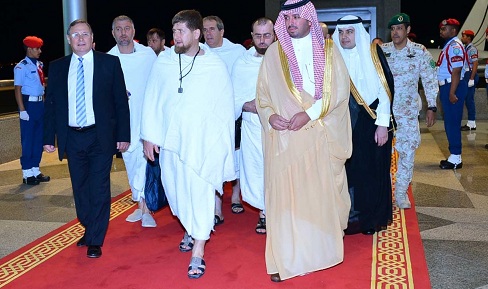
Russia’s Muslims Increasingly Critical of Moscow’s Actions in the Middle East
Publication: Eurasia Daily Monitor Volume: 13 Issue: 8
By:

Russia’s Muslims are slowly realizing that they have a voice in the country’s foreign policy in the Middle East. President Vladimir Putin unexpectedly launched a military campaign in Syria in the fall of 2015, apparently giving little consideration to Russia’s Muslim population. Indeed, Moscow threw its lot in with the Shiite part of the Muslim world in the Middle East, while the vast majority of the Russian Muslims belong to the Sunni branch of Islam. An estimated 15–20 million Muslims live in Russia, but they have largely been complacent about what Russia does in the Middle East. The indifference of Russian Muslims has been explained in part by Moscow’s broad support of Muslim Palestinians in their struggle with Israel, which satisfied the Muslim population of the Russian Federation to some extent. Also Russia allied itself with Iran and Turkey and had neutral relations with the rest of the Middle East. Putin’s surprise intervention in Syria forced Moscow to take sides in the centuries-old divisions in the Muslim world, and Russian Muslims are now becoming much more aware of Russian policies in this important and relatively nearby region.
The recent row between Shiite-majority Iran and Sunni-majority Saudi Arabia has divided Russian Muslims to such an extent that even the most reliable and vocal supporters of Kremlin policy in the Middle East among the North Caucasian governors became unusually cautious. Chechen ruler Ramzan Kadyrov stated that he was not taking sides in the conflict between Iran and Saudi Arabia, announcing via his Instagram account that the two sides should negotiate and reach a compromise in order to avoid “a real war and global catastrophe.” Dagestan’s governor, Ramazan Abdulatipov, also avoided taking sides, saying that “both Shiite and Sunni are Muslims and live in Dagestan. Conflict between them is out of the question. When one side declares the other infidels it is ignorance and foolishness. Politicians make use of this.” Abdulatipov leaned slightly toward supporting Iran more than Saudi Arabia, while at the same time claiming the United States has a role in fueling conflict between the two Middle Eastern powers (Onkavkaz.com, January 7).
In the Middle East, the Kremlin has used the services of Kadyrov, who has made numerous visits to the countries of the region. Having acquired substantial foreign policy expertise in the Middle East, which is quite unusual for a regional governor in Russia, Kadyrov appeared to be more diplomatic in his response to the Middle Eastern crisis than Abdulatipov. Chechnya’s governor tried to remain neutral, which would allow him to be positively received in Sunni countries, while also avoiding antagonizing Iran, which is an official Russian ally. Russian Muslims must now make up their minds about more than simply the recent tensions between the Shiite and Sunni worlds. Putin’s intervention in Syria baffled many Russians, but Russian Muslims were probably affected the most, especially given that Moscow is backing the regime of the Alawite minority against the Sunni rebels.
Tatar analyst Abdulla Rinat Mukhametov wrote that even though Russian Muslims are still grappling with what is going on in the Middle East, the percentage of those criticizing Russian actions is far higher among the Muslims than any other social group in Russia. According to Mukhametov, while the top Muslim clerics have tried to capitalize on the support they provide for Russian policies, mid-level Muslim clerics and ordinary Muslims have been much more reluctant to speak publicly about Moscow’s involvement in the Middle East. Some Muslims remain affected by Russian propaganda that argues Putin is fighting the US and defending “traditional values,” but others are quite critical of the Russian government and express their opinion openly on social networks and the Internet. Mukhametov asserts that the Russian authorities realize that they will not be able to control the country’s Muslim population using only a few puppet Muslim officials, and are becoming concerned about that. The Tatar analyst warned that some forces in the Middle East, such as Iran and Syria, would actually like to draw Russia into the complicated world of conflicts and intrigues in the region, but the risks are quite high for Moscow. Chances are high that Putin’s gamble in Syria will fail, and then the entire paradigm of establishing closer relations with the Muslim world that was declared by Putin back in 2003 will fail, with highly negative consequences for Russia (Golosislama.com, December 17, 2015).
The attitudes of Russian Muslims toward the war in Syria stand out even more in contrast to the Russian Orthodox Church’s support for the war. Patriarch Kirill of Moscow recently endorsed Russia’s involvement in the Middle East, saying: “Since this war is defensive, it is just” (Rbc.ru, January 9). Earlier, Vladimir Putin justified Russia’s air campaign in Syria as a cheap way of performing military drills that would not affect Russian budget in a significant way (Kremlin.ru, December 17). The statements by the Russian president and Russian Orthodox Church indicate the disconnect between the interests of many Russian Muslims and those of the Russian establishment. This divergence is likely to play a role in how the relationship between the government and the country’s growing Muslim community evolves in the near future.




